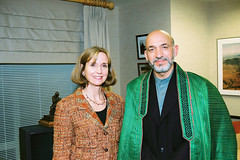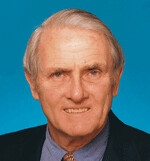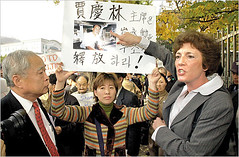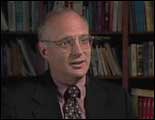Who Will Be America’s Special Rapporteur on North Korean Human Rights?
This certainly is an interesting development–another step forward for the North Korean Human Rights Act. One of the Act’s provisions provides for the appointment of the Special Rapporteur, and the running is apparently down to four candidates. I’ll tell you what I know about each of them. It matters very much, because the the appointee would have the rank of ambassador and would be the strongest possible signal of where this Administration is going with its North Korea policy.
Paula J. Dobriansky
Undersecretary of State for Global Affairs
 Which means she does what, exactly?
Which means she does what, exactly?
[The USGA is] responsible for a broad range of foreign policy issues, including democracy, human rights, labor, counter-narcotics and law enforcement, refugee and humanitarian relief matters and environmental/ scientific issues. She has also been designated as the Special Coordinator for Tibetan Issues.
. . . which is a little worrying, given how little vocal advocacy we’ve heard from our government on behalf of Tibet or refugees. There’s no question that she’s brilliant and well qualified for the job, judging from her official State Department bio:
Prior to her appointment as Under Secretary of State for Global Affairs, Dr. Dobriansky served as Senior Vice President and Director of the Washington Office of the Council on Foreign Relations. She was responsible for managing the Council’s office and operations in DC and for leading Council meetings, study groups, and seminars. Previously, Dr. Dobriansky served as Senior International Affairs and Trade Advisor at the law firm of Hunton & Williams, and as Co-Chair of the International TV Council at the Corporation for Public Broadcasting. Her government appointments include Associate Director for Policy and Programs at the United States Information Agency, Deputy Assistant Secretary of State for Human Rights and Humanitarian Affairs, Deputy Head of the U.S. Delegation to the 1990 Copenhagen Conference on Security and Cooperation in Europe (CSCE), Advisor to the U.S. Delegation to the 1985 UN Decade for Women Conference in Nairobi, Kenya, and Director of European and Soviet Affairs at the National Security Council, the White House. Dr. Dobriansky received a B.S.F.S. summa cum laude in International Politics from Georgetown University School of Foreign Service and an M.A. and Ph.D. in Soviet political/military affairs from Harvard University. She is a Fulbright-Hays scholar, Ford and Rotary Foundation Fellow, a member of Phi Beta Kappa and a recipient of various honors, including Georgetown University’s Annual Alumni Achievement Award, the State Department’s Superior Honor Award, Dialogue on Diversity’s International Award 2001, National Endowment for Democracy (NED) Democracy Service Medal, . . . has served on various boards, including the Western NIS Enterprise Fund, National Endowment for Democracy (Vice Chairman), Freedom House, American Council of Young Political Leaders and the American Bar Association Central and East European Law Initiative, and the U.S. Advisory Commission on Public Diplomacy. She has a working knowledge of French, Russian, Italian and Dutch.
. . . suggesting a right-of-center but not especially messianic outlook, plus too much emphasis on Europe, right? Well, not necessarily. Her father, Lev Dobriansky, was an influential emigre from Eastern Europe, appointed as Ronald Reagan’s ambassador to the Bahamas (which probably means he gave plenty to a few campaigns–not that I fault anyone for that notwithstanding my envy that some people get gigs like that, while others got sent to Fort Irwin). Way back in 1989, while still a young piker at the State Department, she wrote a paper called, “The fight for freedom and democracy in Burma.” She spent the Clinton years in the think-tank wilderness, from where she was critical of President Clinton’s lack of resolve in facing Saddam Hussein. She’s also been affiliated with the avowedly neconservative Hudson Institute (like this guy) and an outspoken proponent of the idea that spreading democracy is the only long-term antidote to terrorism. Most recently, she co-hosted a party for a group called “Women for a Free Iraq” with Jeanne Kirkpatrick.
I’m cautiously optimistic that Ms. Dobriansky would have the full trifecta of qualifications for the job: backbone, intellect, and an understanding of diplomacy. She also appears to line up along the axis between W and Condi, ideologically speaking. For all of those reasons, my money is on her as the most likely bet.
James Lilley
Former U.S ambassador to South Korea (and China)
Senior Fellow, American Enterprise Institute
 I’ve crossed paths with Ambassador Lilley twice, including one brief conversation in an elevator in which we exchanged business cards. He was friendly and polite, but as cautious in his choice of words as you would expect of a wily old ambassador talking to some guy who might well have been one of those bloggers. I mentioned my service in Korea and the woeful state of public opinion there, and while his words were no more caustic than “regrettable”–if I remember correctly–his facial expression and the slow shaking of his head in resigned regret were much more articulate. He’s certainly aware of how bad things are in both Koreas, and he’s regularly in attendance at meetings and conferences dealing with the North Korean human rights issue.
I’ve crossed paths with Ambassador Lilley twice, including one brief conversation in an elevator in which we exchanged business cards. He was friendly and polite, but as cautious in his choice of words as you would expect of a wily old ambassador talking to some guy who might well have been one of those bloggers. I mentioned my service in Korea and the woeful state of public opinion there, and while his words were no more caustic than “regrettable”–if I remember correctly–his facial expression and the slow shaking of his head in resigned regret were much more articulate. He’s certainly aware of how bad things are in both Koreas, and he’s regularly in attendance at meetings and conferences dealing with the North Korean human rights issue.
A brief resume:
– Director, Institute for Global Chinese Affairs, University of Maryland, 1996-1997; senior adviser, 1998-1999
– Philip M. McKenna Visiting Scholar, Claremont McKenna College, 1995
– Assistant secretary of defense for international affairs, 1991-1993
– Fellow, Harvard University, Institute of Politics, 1991
– U.S. Ambassador to the People’s Republic of China, 1989-1991, and to the Republic of Korea, 1986-1989
– Deputy assistant secretary of state for East Asian Affairs, 1985-1986
– Director, American Institute in Taiwan, 1982-1984
– Professor, Johns Hopkins School of Advanced International Studies, 1978-1980
– National intelligence officer for China, 1975-1978
I have no doubt that Ambassador Lilley has the connections and influence to be heard in Washington, and to lesser degrees, and in descending order, in Beijing and Seoul. Nor is Ambassador Lilley just any ambassador; he’s treated with five-star reverence everywhere he goes, even among fairly distinguished groups. Yet when you meet him, it’s painfully obvious that his age is slowing him down physically. At the end of the event at which we spoke, Ambassador Lilley ended up asking me whether I’d seen him carrying a briefcase when he went into the building . . . . There are two reasons why I wouldn’t read too much into that. First, I do things like that constantly myself, and second, his speech gives no hint that his mental agility has dulled in the slightest. Still, one suspects that a man of Ambassador Lilley’s advanced age is unlikely to take on what could prove to be a very acrimonious, tedious, and physically draining assignment if done right.
I have other, more substantive worries as well. Ambassador Lilley still believesthat we can (a) reach diplomatic commonality with Japan, China, and South Korea, (b) reach an agreement with North Korea, and (c) trust North Korea to abide by its commitments in that agreement. I don’t think even one of those things is possible. If you read Ambassador Lilley’s words carefully, he also believes that we can provide North Korea such inducements as trade and aid in exchange for a nuclear deal. He raises human rights in a token paragraph at the end of his piece, almost as an afterthought. I also worry that his early entry into the business of U.S.-China diplomacy suggests an infection of “realism,” and some of his writings support those fears by revealing a stunning degree of moral equivalency about Mao Tse-Tung, a butcher of millions. In other words, his interests are (a) nukes, (b) relations with China, and (c) human rights, in that order. What I’m missing here is why (a) and (c) have different solutions, and how we accomplish (b) if we show weakness.
Suzanne Scholte
President, Defense Forum Foundation
 That would be this Suzanne Scholte, seen here in front of the Chinese Embassy in Seoul last fall. Suzanne is only the most important grassroots organizer for North Korean human rights in the United States, meaning that her elevation to this job would leave a big, empty pair of shoes behind her (this woman would most likely fill them).
That would be this Suzanne Scholte, seen here in front of the Chinese Embassy in Seoul last fall. Suzanne is only the most important grassroots organizer for North Korean human rights in the United States, meaning that her elevation to this job would leave a big, empty pair of shoes behind her (this woman would most likely fill them).
Suzanne has no background in diplomacy; she worked for Reagan during the 1976 primary and later was a staffer on Capitol Hill, where she took an early interest in international human rights issues. According to what I consider a good source, Suzanne is on a virtual first-name basis with Don Rumsfeld.
Of all the candidates, Suzanne is the least likely to screw around before stating the obvious about North Korea. For that reason, her appointment would be followed by a campaign of hissing, back-stabbing, and ankle-biting among the striped pants crowd at Foggy Bottom (that’s the State Department for those of you in Rapid City), as well as among their friends at the Washington Post (this asshat in particular, always a sucker for Potempkin tourism and clearly the worst North Korea reporter on the staff of any major paper). For that reason, I give her little chance to getting the job, although it would be a pump-your-fist-in-the-air moment if she did. Roh Moo Hyun would probably mumble out some more self-pitying threats to resign, and Kim Jong Il would probably seek political asylum in China within 24 hours. She would be mercilless.
I also like Suzanne personally. When you meet her, she gives an impression of being driven, energetic, disinclined to engage in nuanced debate about the obvious, and yet friendly and approachable. Think Dagny Taggart with some of the rough edges and pretty much all of the “rational self-interest” filed off. Nor is she a wild-eyed ideologue; in fact, she has long has a close collaborative relationship with this guy (get ready to be surprised). Because I know what Suzanne would do, and because I know it would be the right thing, she’s my own favorite. Too bad no one will have the stones to pick her, because she’d be great.
Rabbi David Saperstein
Director, Religious Action Center for Reform Judaism
 The biggest question mark of the bunch, since he appears to be one of a dying breed–those who can sincerely call themselves “liberals,” rather than simply leftist reactionaries and nihilists.
The biggest question mark of the bunch, since he appears to be one of a dying breed–those who can sincerely call themselves “liberals,” rather than simply leftist reactionaries and nihilists.
Rabbi Saperstein has headed a government commission on religious liberty and has, along with other religious leaders, called for maintaining sanctionsagainst North Korea pending further improvements in human rights. In my view, that makes him a better choice than Ambassador Lilley, although I worry about a choice of someone with so few political and ideological connections to the Administration. Sure, he’d probably be vocal, but would anyone take him seriously? Then again, being vocal is probably what really matters here. The job is to embarrass people out of doing business with Kim Jong Il until he reforms his regime collapses out of sheer bankruptcy.
Of course, OhMyNews would have to rename itself Der Sturmer, because I can just imagine the Jew-baiting we’d see. Not that history would be so unkind.